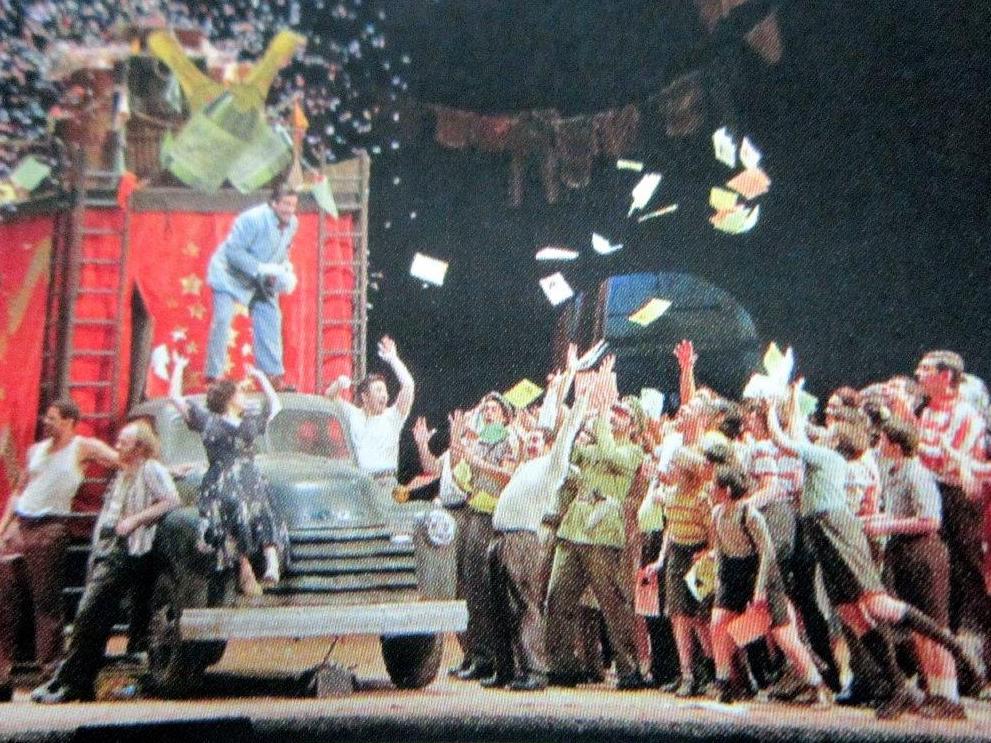
Theatrical Productions: Children in Opera

Figure 1.-- This is a scene from New York Metropolitan Opera production of Ruggero Leoncavallo's .'Pagliacci'. The e action and reset in a New York Italian neighborhood and updated to the 1930s instead of the early 1900s. Opera is the only theatrical form in which productions are almost exclusively the work of historical composers. Note the children in the scene. They contributed to the crowd scenes and the chorus.
|
|
Opera is not one of the more popular teatricals in America, but it is a major attraction throughout much of Europe where it has been performed for four centuries, beginning as might be expected in Italy.
The first production that might be called an opera dates is generally seen as Jacopo Periís 'Dafne' (1590s). Unfortunately only bits of his score have survived. As a result, Claudio Monteverdiís 'Orfeo' (1607) is the earliest production that can be actually heard. Both these early composers were Italians and from that early beginning, Italians have been a major force in the world of opera.
The Italians dominated the Baroque Period 17th-mid-18th century). Baroque opera originated in royal courts where kings and queens became important patrons. This form of opera came to the fore in wealthy courts across Europe (16th century, but soon became popular art form that won favor with the middle class and even many in the working classs. And it spread to much of Western Europe. German-born George Friedrich Handel became a sensation in England. The major Baroque composrs were Antonio Vivaldi, Handel and Jean-Baptiste Lully.
Baroque operas fell out of favor (after the mid-18th century) as what now styled the Clasical Period set in. Willibald Christoph Gluck led the way with Classical Operas. He expanding the structure, harmony and narratives toward a less formalized stle. He have a greater role to the orchestra by developing 'recitativo accompagnato'. This was recitative supported by full orchestra rather than just continuo. Opera continued to expnd beyond Italy and other counties influenced and mixed with other operetic formats. Italian opera seria began to mix with French opera comique and German singspiel as well with other national developments. Important composers included: Gluck, Franz Joseph Haydn and Wolfgang Amadeus Mozart. Gluck and Haydn are not often produced today, but Mozart's operas certainly are: for example 'Don Giovanni', 'The Magic Flute', and 'Cosi Fan Tutte'.
The Romntic Period was the next stage of opera and is the most imprtant period of opera (19th-early-20th century).
Romanticism dominated the operatic stage was the predominant artistic and literary movement until the World War I (1910s). Opera historians define it as a movement formed by the violence and passion of the French Revolution and Napoleonic Wars along with Germanyís Sturm und Drang. Emotion and rebellion became the key notes as Europe moved from the scientific conformity of the Enlightenment and the social change set in motion by the Industrial Revolution. Opera productions larger and lrger and more intensly dramatic. Productions included vast choruses and a magnificent orchestras. Opera companies might include 100 players. This all climaxed with the gigantic works of Richard Wagner. Italy, Germany, and Russia stood out during this period. German opera was dominated by Wagner; Italian opera by Giuseppe Verdi and Giacomo Puccini. Russian composers made a major contribution Mikhail Glinka, Modest Mussorgsky, and Pyotr Tchaikovsky. Modern opera has primarily been the production of earlier rather than new operas. There were dfifferences in scoring and the size of prodyctions, muting the bombast of the great composers, but few contemprary composrs have had major succes.
Children have not played major roles in peratic music. A problen here is the vocal power needed by operetic singers. In addution children seen more suitable for the more intimate Broadway musicals. Several have children's parts and many more have children on the stage without notable parts. One German opera is "Hansel and Gretel". A reader tells us, "Opera is a great venue for kids as all opera companies have children choruses. Many operas have children in crowd scenes. Some even have solo parts although generally small parts." We note that the famed La Scala opera in Milan for a time had a boys' choir.
HBC

Navigate the Boys' Historical Clothing Web Site:
[Return to the Main theatrical form page]
[Return to the Main theatrical page]
[Introduction]
[Activities]
[Biographies]
[Chronology]
[Cloth and textiles]
[Clothing styles]
[Countries]
[Topics]
[Bibliographies]
[Contributions]
[FAQs]
[Glossaries]
[Images]
[Links]
[Registration]
[Tools]
[Boys' Clothing Home]
Created: 1:57 PM 11/16/2017
Last updated: 1:57 PM 11/16/2017



